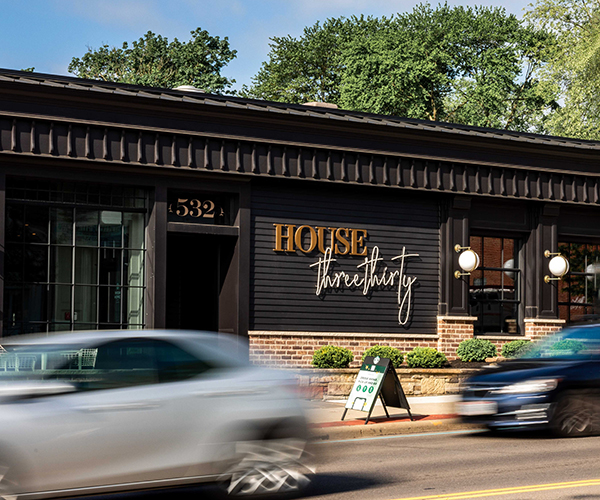Tax breaks and bounding balls have had their share of media, but the dreaded restaurant critic (DRC) issue has surfaced in those august sessions occasionally held by the Northeastern Ohio Restaurant Association. Here restaurateurs compare reviewers to swarms of locusts.
Some of the less democratic members of this restaurant association are seeking a way to silence the still small voice of the DRC. These restaurateurs, of course, do not look at this matter the same way that I do. They think the voice is shrill and vindictive. I think it is the voice of conscience, community spirit, and one of the big differences between us and the Russians.
In fact, I think that the dreaded restaurant critic is as American as one of those hamburgers Shorty serves in his place in the Flats. I know Shorty disagrees with me because under the name Richard J. Iropkoff he is lobbying politicians to pass a law that would require the dreaded ones to be licensed.
Unfortunately, Shorty's plan is both unconstitutional and un-American. It is one thing to have a DRC stop in and beat up on your sauce or service and quite another to make the critic register like some alien aligned with a dark power. DRCs would have to leave their fingerprints on the check and their license numbers at the door.
But I admire Tropkoff. When two people were shot outside of his restaurant, he told me he went on television news and made the situation a positive event. It is no wonder that his peers have made him president of the Northeastern Ohio Restaurant Association.
"Some of the critics have been vindictive and we are concerned," says Tropkoff. "We are being forced to do everything we can to protect ourselves." Shorty cited Cleveland Magazine and The Plain Dealer as offenders.
Being offensive is nothing new for The Plain Dealer, but I took exception to having the magazine mentioned in the same breath.
Tropkoff says that he has written letters to restaurant owners urging them to support only publications that give good reviews. He must have the telephone yellow pages in mind.
Shorty contacted State Representative Daniel P. Troy, a Democrat from Willowick, about the prospects of introducing legislation that would license restaurant critics.
"He (Tropkoff) told me that other states had some kind of legislation that dealt with this situation," Troy says. "We investigated it, but we could not find any. I told him it might be a freedom-of-speech issue which could not be regulated. I told him he could expect a lot of opposition from the newspapers."
Troy is being diplomatic when he talks about media opposition. He and his colleagues are very sensitive to bad reviews, particularly when they appear on editorial pages. Politicians understand the media's view; if it is restaurant critics this time, it may be political columnists the next. And after that, who knows? Baseball writers perhaps? Tropkoff's law might spread to the national pastime. You can bet that all of this would bring smiles to George Forbes and George Steinbrenner.
It is the position of Tropkoff and a committee— made up largely, he says, of restaurateurs who have suffered bad press notices — that reviewers are being unfair in their criticism and depriving some restaurants of business.
I take the position that restaurants ought to be thankful for critics. Can you imagine the culinary egos that would go unfettered if there were none? What would restaurateurs complain about other than the competition and the help? The dreaded critic serves as the ideal scapegoat for any adversity that befalls a restaurant.
Sixteen years ago, there were no restaurant critics here. The restaurant scene was bleak when Cleveland Magazine began publishing in 1972, and there was little news available on the restaurants that existed.
Over the years the magazine published numerous guides, profiles and features that helped the restaurant business in Cleveland become vibrant and alive. Our reviews have been direct and aimed at informing readers and developing an exciting restaurant environment.
To offer a wider perspective on area restaurants, the magazine has initiated the People's Choice Restaurant Awards, a contest designed to give readers an opportunity to vote their palate. (See page 56 for this year's contest.)
All of this came as people dined out more and developed a heightened awareness of food. Now, consumers want more from their restaurants, and more restaurateurs are willing to make a greater commitment to excellence.
The job of the restaurant critic in 1988 is infinitely easier than it was 15 years ago because of these improvements. There was a time when virtually every new restaurant in town was accorded a review. Now, reviewers have the option of deciding whether a place is really worthy of mention. One factor that neither the media nor the restaurant association can overlook is the dramatic influence word-of-mouth has upon the fate of any restaurant. When a truly promising restaurant opens, it is not unusual to find it difficult to secure a reservation despite the fact it has not been reviewed or publicized.
The food crowd, a largely East Side phenomenon, roams the city in quest of the newest place and almost always beats the critics by months in rendering judgment. A rave review by this bunch can provide the kind of impetus that gets a place off to a good start.
As for the critics and their influence, it is generally felt that a good review by a credible critic will help a restaurant. A bad review, while no joyful experience for the chef's ego, does not doom a place to Chapter 11. Inconsistency more than anything else will kill a restaurant. Good criticism and a healthy restaurant community go hand in hand.
Tropkoff, in his discussion on restaurant criticism, cited a new restaurant that promoted itself as serving a particular specialty. A critic charged that the specialty was not authentic.
"Of course it was not authentic," Tropkoff says." People in Cleveland would not eat the real stuff."
One wonders why the restaurant promoted itself in that manner in the first place, particularly in light of the fact that more American people than ever before are traveling for food experiences. Those who know will raise a question.
Tropkoff says the association is trying to agree on a standard criteria to suggest for critics. Both readers and restaurateur deserve to know what standards are involved in the process of reviewing restaurants.
One standard that should be demanded of critics is an arm's-length relationship with restaurant owners. Some Cleveland food writers have served as restaurant consultants. Such conflicts undermine the credibility of all reviewers.
A restaurant review should be serious work and not a social event. Often, numerous visits to a restaurant are required to measure the different conditions under which the restaurant must perform.
Cleveland Magazine requires its critic to visit unannounced and maintain anonymity in order to experience routine treatment. In a town the size of Cleveland, one cannot hope to remain anonymous forever, but it is a desirable status to maintain.
Among Iropkoffs objections is that Cleveland critics compare restaurants here with trendy counterparts in other cities. He says this is unfair because the marketplaces are different. This may be so, but communication and travel have had a growing impact on local restaurants. Besides, it is only natural to compare food experiences.
Tropkoff says it is unfair to review a restaurant before it has been in operation under the same owner for six months.
Traditionally, we have given a restaurant three to four months before a review. There is a certain news value to a new restaurant, and timeliness along with fairness should be a consideration.
Then there is the matter of the critic's qualifications. There is no course that one studies to become a restaurant critic. There is an absolute need to know and understand food and its preparation. It is one of those pursuits in which experience plays a major role and to experience you have to eat and eat and eat.
Food criticism is no different than other subjects dealt with by the media. The responsibility for fairness and ethical conduct must be part of the media's daily regimen because the process exists on trust.
Of course, it would be unfair to Mr. Tropkoff not to disclose the fact that I have lived with a restaurant critic for the past 18 years. I have been present for over 500 reviews, and I know that the work is hard and sometimes unpleasant.
So Shorty, you will understand when I tell you that my wife made me write this column. Remember, you only have to deal with her on occasion, but my cooking gets reviewed several times a week.



